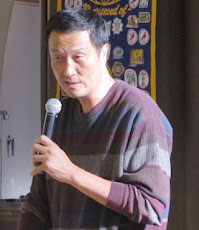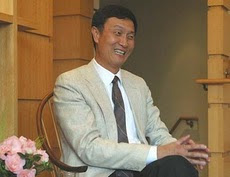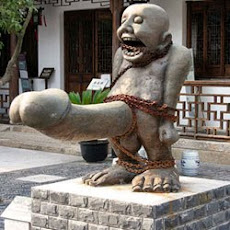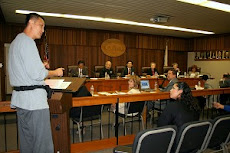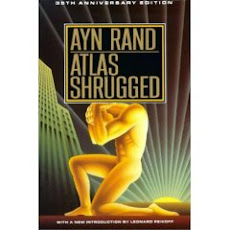 Confucius Institutes: Getting Schooled by Beijing
Confucius Institutes: Getting Schooled by Beijing
孔子学院--北京的洗脑术
Spymaster Fadden warns Confucius Institutes aim to teach more than language: Chinese regime uses academic institutes to expand its soft power. By Matthew Little July 16, 2010
TORONTO—When Chinese authorities sent in paramilitary troops to quash Tibetan unrest just months before the Beijing Olympics in 2008, one University of Waterloo instructor rallied her students to “work together to fight with Canadian media” who reported the regime’s heavy-handed tactics.
Yan Li, a former reporter with the Chinese Communist Party’s official Xinhua News Agency, recounted her efforts to confront media sympathy with “Tibetan separatists” in an article posted on a website serving Chinese literature scholars in North America called Wenxinshe.
Yan used class time to explain “the history of Tibet and its current situation,” showing students a map with Tibet clearly inside China.
“Under her influence, some Canadian students bravely debated with anti-China elements on the Internet, some wrote to television stations and newspapers to point out that their reporting was not according to the facts,” the article said.
Eventually, one major Canadian television station even apologized as a result of the “combined efforts” of Yan and her students.
And none of this would have been possible without Beijing’s efforts to establish Confucius Institutes, such as the one Yan directs at the University of Waterloo.
Ms. Yan explained.
“What deeply touched me was that though the state still has many areas still needing urgent improvement, they invest such a huge amount of money abroad to establish Confucius Institutes one by one,” Ms. Yan was quoted. “From a strategic perspective, perhaps this is a necessary part of the long-term plan, to gain the world’s understanding and friendship as China is rising again.”
It’s a huge investment indeed. The BBC reported in 2006 that the Chinese regime had set aside US$10 billion to establish the first 100 Confucius Institutes by this year. Then the plan grew. According to Xinhua, there are 316 Confucius Institutes in 94 countries and regions as of this month, with more on the way.
Soft Power 101 The schools are part of a broader effort by the regime to extend “soft power” via culture and education. When visiting Chinese leader Hu Jintao met with Prime Minister Stephen Harper in Ottawa last month, the two came away announcing plans for a Chinese-funded cultural centre in Canada, and plans for Beijing to host 100 Canadian education officials and principals, and 100 middle school students on visits.
But the growth of the Confucius Institutes concerns those who monitor Chinese efforts to exert influence in Canada.
Besides his explosive comments that some Canadian politicians could be under foreign influence, CSIS (Canadian Security Intelligence Service) Director Richard Fadden also exposed the danger posed by the quiet expansion of Confucius Institutes in Canadian post-secondary schools.
While the Chinese regime promotes the institutes as a place to learn Chinese language and culture, they are commonly seen as part of Beijing’s efforts to expand its soft power and non-military influence. Critics of the institutes allege they are propaganda entities that can interfere with the academic independence of the universities they are often attached to.
Speaking to an audience of police, military and intelligence personnel at the Royal Canadian Military Institute in March, Fadden said the institutes are controlled by Chinese embassies and consulates. He lumped them together with some of Bejing’s other efforts to steer Canadian China policy.
Evidence was on display during Hu's visit to Canada in June when a crowd of hundreds gathered on Parliament Hill in Ottawa to both welcome Hu and shout down protesters concerned with human-rights abuses in China. In the crowd were a group wearing T-shirts with labels identifying them as being from Montreal's Confucius Institute, which is hosted at Dawson College.
The recording of a speech at the Chinese embassy obtained by The Epoch Times showed the rally was funded and organized by the embassy with the intent of waging "war" with protesters. Several groups have now called for the expulsion of Mr. Liu Shaohua, the embassy official caught on tape.
The Chinese regime doesn’t deny the role that Confucius Institutes have in building influence overseas. Li Changchun, the Chinese Communist Party's Propaganda Chief and fifth-highest ranking member of the ruling Politburo Standing Committee, calls the institutes “an important part of China's overseas propaganda set-up.”
Canada is host to seven Confucius Institutes, four of them attached to post-secondary schools including McMaster University and the British Columbia Institute of Technology. They offer Chinese language and cultural classes, sometimes with course credit in degree programs.
Trouble in the Schoolyard It is not the language classes that raise concerns so much as the institute’s intentions and extra-curricular activities. Over the years, those activities have included getting universities to shut down events put on by groups Beijing doesn’t like and pushing students to protest western media’s coverage of China.
In 2006, one faculty member at Stockholm University’s institute tried to stop the school’s Asia Pacific studies department from having Erping Zhang as a visiting scholar because of his volunteer work for the U.S.-based Falun Dafa Information Center. An email from that professor was sent to the university’s faculty alleging Zhang was not a scholar, despite having five degrees including a Master's in International Affairs from Harvard’s Kennedy School of Government.
In Israel, a judge ruled Tel Aviv University had bowed to the Chinese regime by shutting down an art exhibition about the oppression of Falun Gong in China put on by students because the school feared losing perks provided by the Chinese regime, including a Confucius Institute.
As the University of Sydney closed a deal to have its own Confucius Institute in 2007, Jocelyn Chey, a former diplomat and visiting professor there told the Australian that having the institute on campus was going to make it difficult for academics to maintain their freedom and independence.
The University of Pennsylvania never applied to host an institute over concerns the regime would try to meddle with its curriculum while the University of British Columbia declined an offer to host one.
Sonny Shiu-Hing Lo, a political science professor at the University of Waterloo, says there is no doubt the institutes are part of the Chinese regime’s soft-power campaign, but that doesn’t necessarily make them subversive in nature, just unusual to Westerners.
He says that controversial activities associated with the institutes are unintended consequences of their close alignment with Beijing.
Working under the Ministry of Education as part of China’s united front efforts to enlist non-communist supporters to its side, the institutes educate students to become sympathetic to official Chinese-state views, said Lo.
“In the long run, the cultural impact and the hidden diplomatic and political impact of Confucius Institutes will be tremendous. It is a long term strategy,” he added.
He said key personnel for the institutes will be recommended by the Chinese Ministry of Education in China so “definitely their thinking tends to be political acceptable to mainland Chinese government.”
Others see the influence as less benign. Writing for Washington, D.C.-based democracy monitor Freedom House last year, sinologist Perry Link and journalist Joshua Kurlantzick included the Confucius Institutes as one of the means Beijing uses to undermine democracy, describing them as "authoritarian soft power."
"The United States and other democracies need to be more aware of the workings of the CCP’s soft-power initiatives around the world, and particularly the ways in which they protect and promote authoritarian rule," the two authors wrote.
Subversive or not, the explosive growth of the institutes has worried not only CSIS, but the U.S. Congress as well.
U.S. concerns In its 2008 report to Congress, the US-China Economic and Security Review Commission noted China’s Central Propaganda Department controlled the media, internet and cultural and education institutions to make sure everyone stays in tune with the regime’s perspective. That control applies to the Ministry of Education that oversees the spread of Confucius institutes around the world.
“The propaganda system’s central purpose is to perpetuate the political authority of the Chinese Communist Party by concealing negative information about the party and its history and by propagating narratives intended to bolster the party’s authoritarian rule,” said the report. In 2009, the commission’s report noted how the regime was working to shape the opinions of China in elite policy-making circles by influencing the commentary coming out of U.S. academics and think tanks.
“This takes the form of providing both positive rewards to ‘friendly’ scholar—such as preferred access to interviews and documents—as well as taking punitive actions such as denying visas for academics who anger Beijing. These rewards and punishments offer the Chinese government leverage over the careers of foreign scholars and thereby encourage a culture of academic self-censorship.”
The long-term impacts of that and the role of Confucius Institutes is mentioned in a paper published by the same commission titled China’s Use of Perception Management and Strategic Deception. "Developments over the last ten years strongly suggest Beijing has come to understand and practice strategic communication—getting the right message to the right audience through the right medium at the right time. The breadth of this effort is indicative of a global campaign intended to paint China in the hues Beijing selects, not those imposed by external critics."
The same paper's mention of the regime's US$6.5billion plan to start an English-language news network to rival CNN or the BBC and give Beijing's take on current events.
The paper notes that the U.S. State Department’s International Security Advisory Board is concerned that China is in the midst of a comprehensive strategic deception campaign.
It also details China’s plans to open 1,000 institutes around the world by 2020. Half of those are expected to have opened by this year. Universities are attracted to the institutes by the offer of free teaching staff supplied by Beijing, and in some cases, kickbacks from the regime.
Lessons in propaganda Last month, Brock University in St. Catharines, Ont., announced its own institute and over $150,000 in startup cash and up to $100,000 in annual project funds provided by the regime.
But such funding comes with a catch, and could give the regime leverage over the school, say critics.
For example, Brock could find itself in the position of hosting a forum to deny the widely reported human rights abuses in Tibet.
That happened last year when Minister Xie Feng, Deputy Chief of the Chinese Embassy in Washington D.C., told delegates at an event at the Confucius Institute at the University of Maryland about how China freed Tibet from slavery. He went on to refute and attack claims of abuses made by human rights groups.
“The freedom of religious belief and normal religious activities of the Tibetan people are protected,” he said, failing to mention that carrying a picture of the Dalai Lama is a crime or that monks regularly protest religious persecution.
“Tremendous changes have taken place in Tibet over the past 50 years. Tibet has progressed from darkness to brightness, from poverty to prosperity, from autocracy to democracy, and from self-seclusion to opening up. The problem between us and Dalai Group is not over ethnic, religious or human rights issues, nor is it over whether autonomy is needed. Rather, it has always been a struggle between progress and retrogression.”
That’s what Beijing would have us believe. Now they’re getting their chance.
 School Kids being Used as Tools for Jay Chen (Vice President of School Board)
School Kids being Used as Tools for Jay Chen (Vice President of School Board) Jay Chen is a leftist radical brainwashing schoolkids with Marxism/communism.
Jay Chen is a leftist radical brainwashing schoolkids with Marxism/communism. 























